ERP vs CRM: Which One is Right for Your Business?
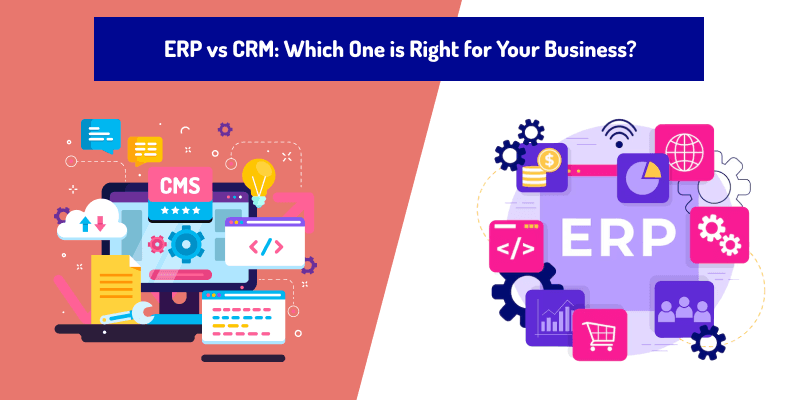
In the modern business world, having the right software to manage operations and customers is essential. Two commonly used systems are ERP (Enterprise Resource Planning) and CRM (Customer Relationship Management).
While they might seem similar, ERP and CRM focus on different areas of a business. Choosing the right one depends on your company’s specific needs.
Let’s break it down in simple terms so you can decide what works best for your business.
What is ERP?
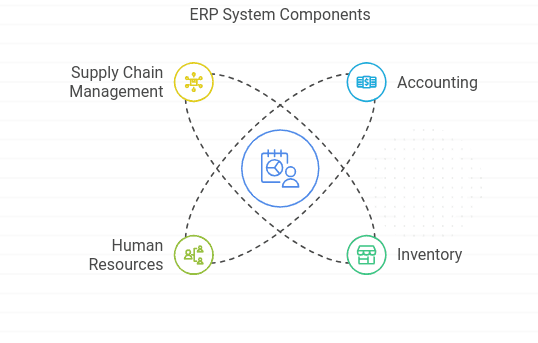
ERP stands for Enterprise Resource Planning. It’s a system that helps businesses manage their core operations, such as accounting, inventory, human resources, and supply chain. ERP is like the backbone of your company, keeping everything running smoothly.
Benefits of ERP
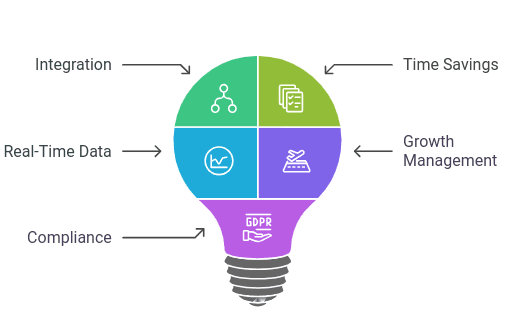
Bring Everything Together: ERP connects all departments (like HR, finance, and logistics) into one system, making communication easier.
Save Time: It automates repetitive tasks like payroll or creating invoices.
Give Real-Time Data: You get up-to-date reports and dashboards to make smarter decisions.
Handle Growth: It’s built to scale with your business as it grows.
Ensure Compliance: ERP helps you follow tax laws and other regulations.
Example:
A manufacturing company uses ERP to manage inventory and production schedules. By connecting their supply chain and warehouse operations, they ensure they have the right materials available when needed, reducing delays and costs.
Why Should You Consider ERP?
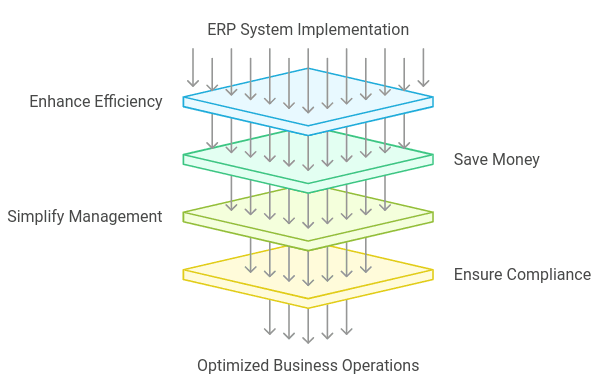
It improves efficiency by cutting down manual work.
It helps you save money in the long run by reducing errors and unnecessary expenses.
It makes it easier to manage different parts of your business in one place.
It ensures you stay compliant with legal requirements.
What Are the Challenges?
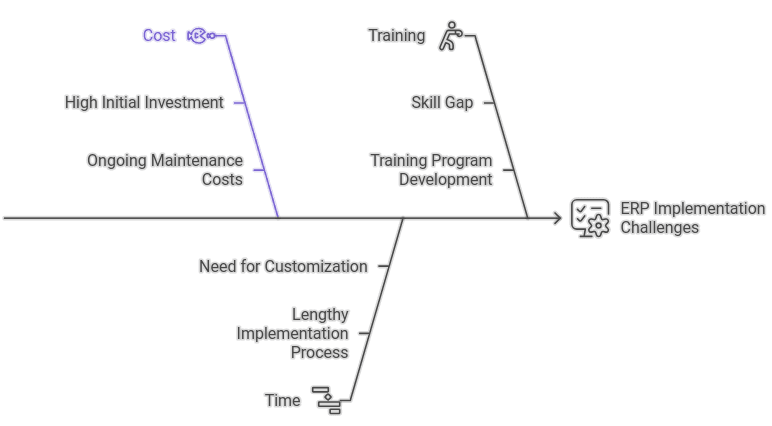
ERP systems can be expensive, especially for small businesses.
Setting up ERP takes time and planning. It’s not something you can do overnight.
Employees may need training to use the system effectively.
What is CRM?
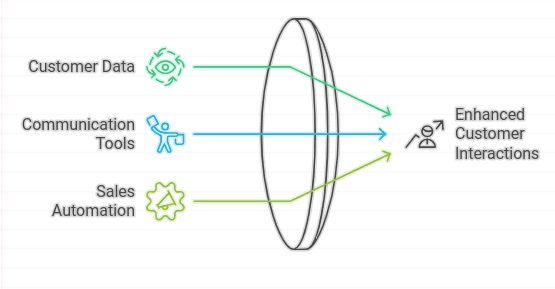
CRM stands for Customer Relationship Management. It focuses on building and maintaining relationships with your customers. If ERP is about managing your internal processes, CRM is all about your customers and how you interact with them.
Benefits of CRM
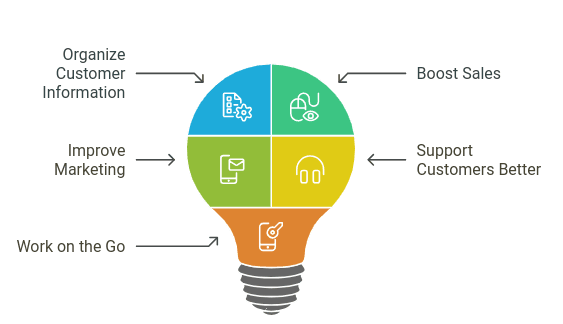
Organize Customer Information: It stores customer details, purchase history, and past interactions.
Boost Sales: CRM tracks leads, follow-ups, and deals, so your sales team never misses an opportunity.
Improve Marketing: It helps you create targeted campaigns based on customer preferences.
Support Customers Better: CRM allows you to track and solve customer issues quickly.
Work on the Go: Many CRM tools are mobile-friendly, so your team can access customer info anywhere.
Example:An e-commerce business uses CRM to track customer purchases and send personalized product recommendations. This improves customer satisfaction and increases repeat sales.
Why Should You Consider CRM?
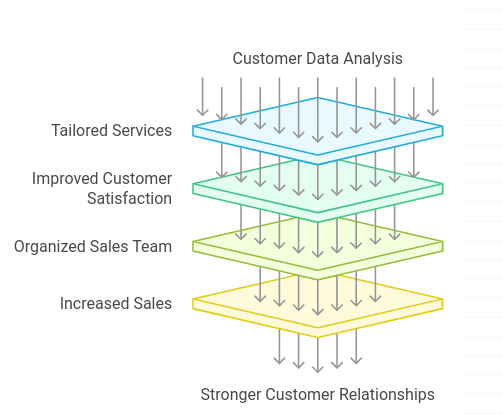
It helps build stronger relationships with customers.
It can increase sales by helping your team stay organized.
It improves customer satisfaction by providing better service.
It gives you insights into customer behavior, so you can tailor your services to their needs.
What Are the Challenges?
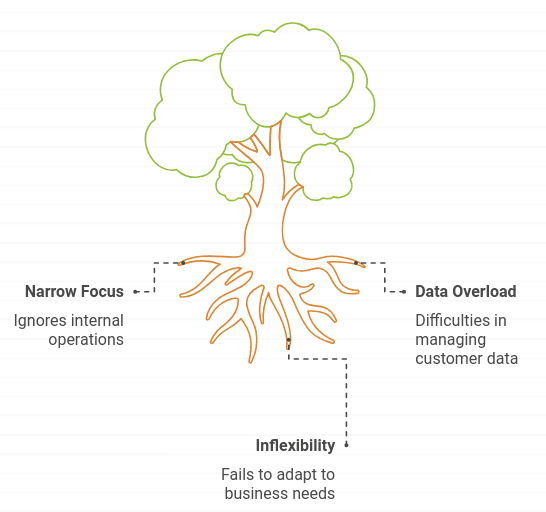
CRM only focuses on customer-facing activities and doesn’t handle internal operations.
Managing a lot of customer data can feel overwhelming if not done properly.
Some CRM tools may not be able to handle your business needs as you grow.
How ERP and CRM Are Different
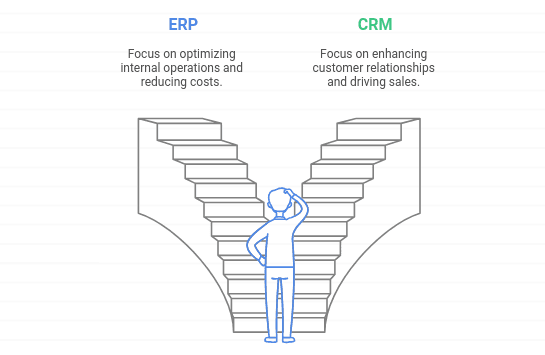
Focus: ERP is designed to optimize internal operations such as inventory, finances, supply chain, and HR, while CRM focuses on customer-facing functions like sales, marketing, and customer support.
Purpose: ERP ensures smooth business processes by centralizing core operations, whereas CRM enhances customer relationships to boost sales and loyalty.
Users: ERP is primarily used by internal teams such as finance, operations, and HR, while CRM is used by sales, marketing, and customer service teams who interact directly with customers.
Data Managed: ERP deals with operational data such as payroll, inventory levels, production schedules, and financial reports. CRM handles customer data such as leads, contacts, customer preferences, and communication history.
Role in Business: ERP focuses on reducing costs, improving operational efficiency, and ensuring compliance. CRM is aimed at increasing revenue by improving customer retention, satisfaction, and acquisition.
Integration: ERP integrates various internal departments to create a unified system, while CRM integrates customer data across touchpoints to provide a 360-degree view of customers.
Time Orientation: ERP often works with historical and real-time data to manage ongoing operations. CRM emphasizes future-focused data, like tracking leads and predicting customer behavior.
Scalability: ERP systems are essential for businesses aiming to scale internal processes and reduce manual work. CRM systems are ideal for scaling customer interactions and improving sales strategies.
Decision-Making: ERP supports decision-making by providing insights into business performance and resource allocation. CRM helps make data-driven decisions to improve customer engagement and campaigns.
Overall Role: ERP helps businesses run efficiently by aligning internal workflows, reducing costs, and ensuring compliance. CRM focuses on growing businesses by driving customer satisfaction, loyalty, and revenue growth.
Can You Use Both ERP and CRM?
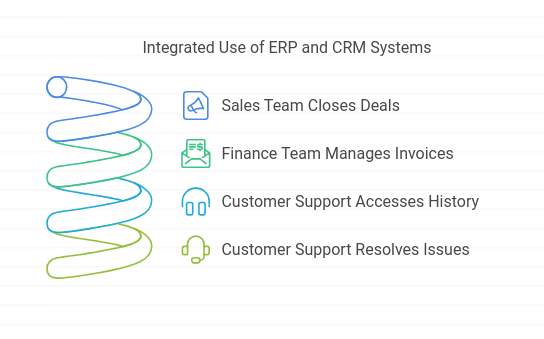
Yes, many businesses use both ERP and CRM together to cover all their needs. For example:
Your sales team can use CRM to close deals, and your finance team can use ERP to manage invoices for those deals.
Your customer support team can access customer history (from CRM) and order details (from ERP) to solve issues faster.
When ERP and CRM are integrated, your business runs like a well-oiled machine. Everyone has the information they need, and processes become smoother.
What About the Costs?
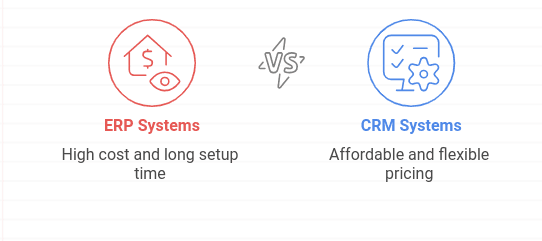
Cost is an important factor when deciding between ERP and CRM.
ERP systems are generally more expensive because they handle so many areas of a business. They can also take more time and money to set up.
CRM systems are usually more affordable and are priced based on the number of users or features you choose.
If your budget allows, using both systems together can give you the best results.
Future Trends for ERP and CRM
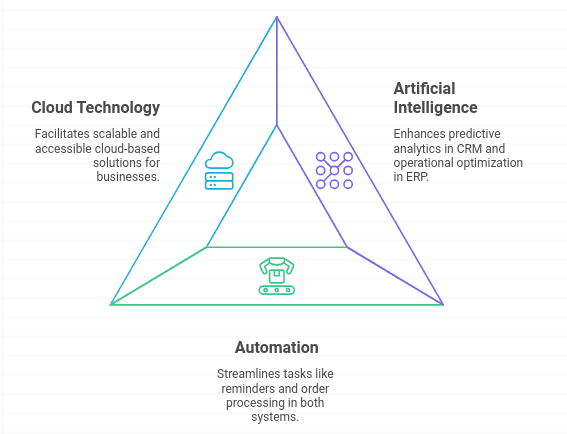
Both ERP and CRM are evolving with new technologies. Here’s what’s coming:
Artificial Intelligence (AI): AI is helping businesses predict customer behavior (in CRM) and optimize operations (in ERP).
Automation: Both systems are getting better at automating tasks like sending reminders or processing orders.
Cloud Technology: More businesses are moving to cloud-based ERP and CRM solutions because they’re easier to access and scale.
Which One Should You Choose?
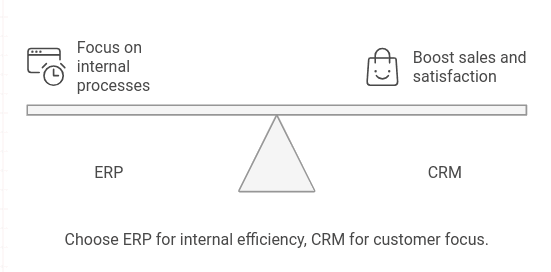
Choosing between ERP and CRM depends on your business goals:
If you want to improve your internal processes, such as managing finances, HR, or supply chain, go with ERP.
If your main goal is to grow sales and keep customers happy, start with CRM.
If you want the best of both worlds, consider integrating both systems.
Every business is different, so think about your needs, challenges, and long-term goals before deciding.
FAQ
Conclusion
ERP and CRM are both powerful tools that can transform your business. ERP helps you manage your internal operations efficiently, while CRM helps you build better relationships with your customers.
